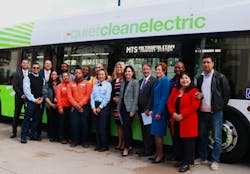San Diego MTS delivers $1 billion in annual value to regional economy according to report
According to a report conducted by the Fermanian Business & Economic Institute at Point Loma Nazarene University, the San Diego Metropolitan Transit System (MTS) generated $1 billion in positive economic impact for the region.
The report concludes that every dollar of public investment returns $2.82 in the form of jobs, infrastructure investment, productivity gains, environmental benefits and money saved by riders.
“MTS is connecting the economy in San Diego. Access to a convenient, safe and reliable transit system is the cornerstone of major metropolitan cities,” said MTS Board Chair Supervisor Nathan Fletcher. “It plays a significant role in bringing more investment, attracting talent and reducing greenhouse gas emissions. This Economic Impact Report highlights the numerous benefits that MTS is already bringing to San Diego communities, and why continued support of MTS is a wise investment in our transportation future.”
The report shows the transit system generates positive economic impact through several channels, particularly jobs. MTS is responsible for nearly 13,000 jobs and approximately $625 million in total personal income. This includes capital spending, direct and indirect employment and service contracts.
“As the region considers the future of transportation, it is important for policymakers, business leaders and residents to know the economic linkages and effects of its transit system,” the report said.
Transit is a link connecting workers and employers, and it provides access to education and job training programs; more than 300,000 trips each weekday take San Diegans to and from work or school. And with the U.S.-Mexico border a major economic gateway, transit links workers living in Mexico with employers in San Diego, with about 19,000 bus and trolley trips serving the border daily.
“MTS not only does an exceptional job of moving people to and from work, college campuses, Petco Park and elsewhere, it also is a powerful economic engine in our region,” said Jaymie Bradford, San Diego Regional Chamber of Commerce executive vice president and chief operating officer.
MTS also helps riders save money on transportation. Riders saved an estimated $861 million on transportation last year, with most of those savings happening for low-income families, who comprise most MTS riders.
The report also examined the impact of MTS on reducing the region’s carbon footprint and achieving Climate Action Plan goals. By riding transit, MTS riders helped reduce the region’s greenhouse gas emissions by 97,000-metric tons, the equivalent of 403 million fewer car miles driven and 106 million fewer pounds of coal burned, according to data from the Environmental Protection Agency, translating to $13.6 million in environmental savings.
The study also found a positive impact from the safety of transit compared to personal vehicles. By reducing the number of deaths, injuries and property damage caused by car accidents, MTS helped the region save an estimated $6.1 million in expenses related to income loss, health care, rehabilitation and car repairs.
“What is particularly notable about MTS is that it delivers these benefits in a competitive, cost-effective way,” said Lynn Reaser, chief economist of the Fermanian Business & Economic Institute. “We found that MTS outperforms the transit systems of the other 15 largest metropolitan areas in the U.S., with the highest cost recovery rate and among the lowest rider costs in the nation.”
MTS commissioned the Fermanian Business & Economic Institute to conduct the study based on economic data from the fiscal year ending in June 2018. The institute has a track record of conducting similar studies for institutions such as the U.S. military and the San Diego Housing Commission.
